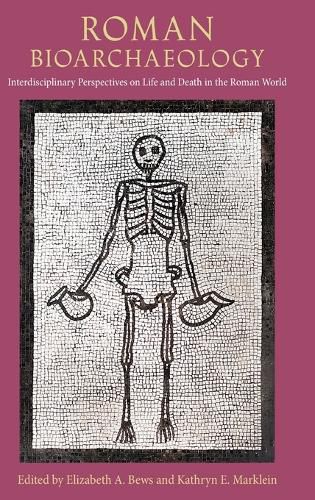Readings Newsletter
Become a Readings Member to make your shopping experience even easier.
Sign in or sign up for free!
You’re not far away from qualifying for FREE standard shipping within Australia
You’ve qualified for FREE standard shipping within Australia
The cart is loading…






How bioarchaeology can illuminate the lived experiences of people in the Roman Empire Research on the Roman Empire has long focused on Rome's legendary leaders, culture, and conquest. But at the empire's peak, tens of millions of ordinary people coexisted in its territories-people who built the structures, wrote the literature, and transformed the landscapes we study today. In Roman Bioarchaeology, researchers use human skeletal remains recovered from throughout the Roman world to portray how individuals lived and died, spanning the empire's vast geography and 1,000 years of ancient history.
This volume brings together scholarship from archaeological sites in Europe, the Eastern Mediterranean, and Africa, featuring new and advanced scientific approaches including DNA studies, stable isotope analysis, paleoparasitology, paleopathology, biodistance, and more. Throughout, contributors prioritize the ethical treatment of the deceased by highlighting individual narratives and working with local descendants where possible. From rural homes in Britannia to bustling cities in Phoenicia, these essays showcase the diversity of Roman lives and illuminate the experiences of the most vulnerable in these societies. This book demonstrates how bioarchaeology can enrich our understanding of many facets of life in the Roman world.
Contributors: Piers Mitchell | Mario Caric | Efthymia Nikita | Gabriele Scorrano | Mahmoud Mardini | Serena Viva | Tracy Prowse | Kathryn E. Marklein | Mario Novak | Olga Rickards | Marissa Ledger | Anna Osterholtz | Pier Francesco Fabbri | Leslie Quade | Sammuel Sammut | Fabio Macciardi | Rebecca Pitt | Elizabeth A. Bews | Mary Lewis | Rebecca Redfern | Rebecca Gowland
?
A volume in the series Bioarchaeological Interpretations of the Human Past: Local, Regional, and Global Perspectives, edited by Clark Spencer Larsen
$9.00 standard shipping within Australia
FREE standard shipping within Australia for orders over $100.00
Express & International shipping calculated at checkout
Stock availability can be subject to change without notice. We recommend calling the shop or contacting our online team to check availability of low stock items. Please see our Shopping Online page for more details.
How bioarchaeology can illuminate the lived experiences of people in the Roman Empire Research on the Roman Empire has long focused on Rome's legendary leaders, culture, and conquest. But at the empire's peak, tens of millions of ordinary people coexisted in its territories-people who built the structures, wrote the literature, and transformed the landscapes we study today. In Roman Bioarchaeology, researchers use human skeletal remains recovered from throughout the Roman world to portray how individuals lived and died, spanning the empire's vast geography and 1,000 years of ancient history.
This volume brings together scholarship from archaeological sites in Europe, the Eastern Mediterranean, and Africa, featuring new and advanced scientific approaches including DNA studies, stable isotope analysis, paleoparasitology, paleopathology, biodistance, and more. Throughout, contributors prioritize the ethical treatment of the deceased by highlighting individual narratives and working with local descendants where possible. From rural homes in Britannia to bustling cities in Phoenicia, these essays showcase the diversity of Roman lives and illuminate the experiences of the most vulnerable in these societies. This book demonstrates how bioarchaeology can enrich our understanding of many facets of life in the Roman world.
Contributors: Piers Mitchell | Mario Caric | Efthymia Nikita | Gabriele Scorrano | Mahmoud Mardini | Serena Viva | Tracy Prowse | Kathryn E. Marklein | Mario Novak | Olga Rickards | Marissa Ledger | Anna Osterholtz | Pier Francesco Fabbri | Leslie Quade | Sammuel Sammut | Fabio Macciardi | Rebecca Pitt | Elizabeth A. Bews | Mary Lewis | Rebecca Redfern | Rebecca Gowland
?
A volume in the series Bioarchaeological Interpretations of the Human Past: Local, Regional, and Global Perspectives, edited by Clark Spencer Larsen